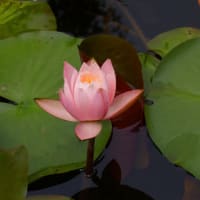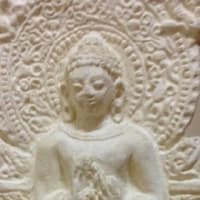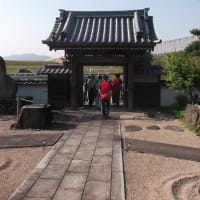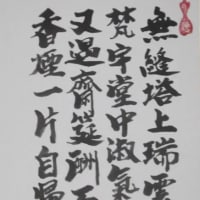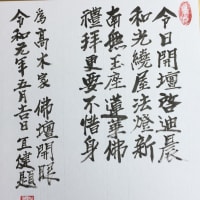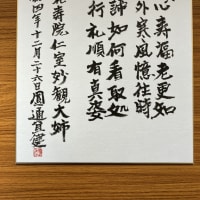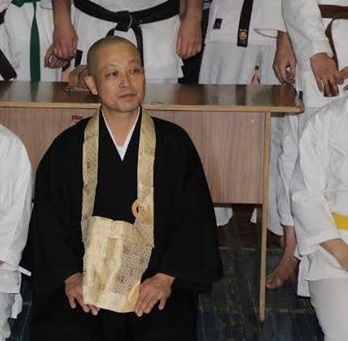◯Kakushyo Takagami (1894~1948) was a monk belonging Shingon sect and a Buddhist scholar. “The lecture of Hannyashin sutra“ was published in 1934 and was the best sale for a long. It is a marvelous recording lecture. It is useful to understand ordinary people due to writing down for radio broadcasting while divided twelve times. He studied Zen by way of Dr. Kitaro Nishida at Otani university in Kyoto. So, he knew about Zen.
The first lecture. The truth wisdom
1) If seeing our existing world by the wisdom of Hannya, there is nothing useless and worthless things in all respect.
2)There is nothing worthless things in the world to the truth―an awakened person. by Buddha’s eye. Yes, all grasses are medicines. One who feels worthless means that the wisdom brain is small. If viewing by the large wisdom’s brain named Hannya, everything means the expression of the holy truth.
3)Today and tomorrow are insignificant days. By gathering insignificant days, we have built up our life. Far from it, it is a holy single day. Which do you choose to achieve in your life, an insignificant day or a holy day? For that reason, it is significant keeping on our minds together. it means how to have your mind.
4) there is nothing worthless itself. Because the wisdom’s brain to see is simply small. According to the wisdom of Hannya which is woven into the Hannyashin sutra, there is nothing worthless things in the world. On the contrary, they are all holy beings to each other in which becoming to be front or back, shaded place or sunny place, making full use of themselves or by others.
5) By polishing the wisdom of Hannya having each other, we must be more sacred and respectably used for all existence.
6) I am often inquired about by the audience. What is the teaching about Buddhism?
I respond simply.
‘Buddhism is Buddha’s teaching. That is to say. Buddha’s teaching is that humans become Buddha.’
Buddhism teaches us to become a Buddha and attain Buddhahood.
7)This sutra has nothing sound of religion, and never goes out of date. It teaches us what is the real truth and the wisdom frankly as it is and is the fresh sutra forever.
The second lecture. Better to walk than to talk
8) There are four ways to look at things to see, to observe, to inspect, and to perceive.
Incidentally, to see means seeing with the naked eye. To observe means Avalokitesvara’s observation is what to see given heart. So, to observe means to see with the heart’s eye minutely. To tell the truth, we can notice real features distinctly by observing.
9) Musashi Miyamoto said that he would see or observe with his eyes. As he mentions, only the eyes of observation can learn the secrets of Japanese fencing. He insisted on observation and confirmed that the eye of mind was the most important training for Japanese fencing. But it is also important to do business, study, and everything else, not just only Japanese fencing in Japan. Meantime, the most important thing is to see by the eye of the mind.
10) It should be attention that the character is Gyo which means practicing Prajunya Pramita. It is heavily important for this character. I did not dare anticipate Goethe’s words. The soul of religion is better to walk than to talk. Well, religion should not talk, should walk. Moreover, Gyo means this practicing. Practicing means to walk, to carry out.
11) Buddhism teaches three types of wisdom in short. Those are the wisdom to hear, the wisdom to think, and the wisdom to practice.
First, listening wisdom simply means wisdom that can be heard from the ear. That is a little wisdom. That is certainly wisdom. But it cannot say true wisdom.
Second, the wisdom to think means the wisdom gained by thinking. It is the wisdom to reconsider and judge the wisdom of hearing again. That is the wisdom that is being considered.
In addition, practicing wisdom means to grasp by practicing. You can get it by practicing yourself. Therefore, this is a religious area. That means it is better to walk than to talk.
12) Let us chant Hannyashin sutra by our heart and learn it by body practice. Let us practice the religion of it not just only knowledge of philosophy voluntarily.
13) First, let me talk about the story of ‘Five components‘. This word was translated from the Sanskrit words Pañca Skandha. Pañca means five as a number. Skandha means an aggregate. Therefore, Buddhist scholars interpreted it as an aggregate and a component. Moreover, the Five Components are always in motion themselves, not stopped. Sanskrit scholars translated it into movement. It is very interesting.
14) Materialism explains everything in the world, and Spiritualism sees everything in the world as the focus of the spirit, they have a prejudice together. Buddhism does not approve of them.
Buddhism has a basic view that subjectivity, objectivity, and everything consists of a collection of five elements. So, the so-called, teaching to be one with things and mind or denying separation of the bodily shape and mind teaches us the correct view of the world or life.
15) A complete expression of our language and thoughts is incomplete. We cannot easily talk about our thoughts and what we want to discuss. The miserable world and the most enjoyable heart cannot be expressed as it is by writing or speaking.
16) From ancient times, it has been said that Yuima’s silence is like thunder. The word silence has big considerable meanings. Fireflies that cannot sing suffer from love. It is said that you cannot cry when you are sad really. That is the saddest world. The saddest time is when tears do not come out.
17) When someone asks for the impression of drinking a cup of water, how do you respond about it? You cannot understand to taste water unless you drink it yourself. Whether it is delicious or not, spicy or sweet, you cannot decide to taste it. So, needless to say. Let us drink a cup of tea.
18)When you have had a child, you can understand the worries and joys of parenting before anything else, like that, you can thank not only your parents but also your child simultaneously. Thanks to noticing completely owing to a child that child is the cutest existence than others in the world. We must be grateful for the love of our children, the joy of acting altruistically and taught unselfishness through parenting children.
19) Behind just one word of ‘emptiness’ is a vast and profound teaching. The emptiness of the word is fully incorporated into the profound philosophy of Buddhism. This is the extract of Buddhism.
20)Avalokitesvara directly experienced profound emptiness. One who truly understands emptiness and devotes himself completely to emptiness is undoubtedly alive Avalokitesvara. Hence, at least we need to discover Avalokitesvara in our figure and find ourselves in Avalokitesvara.
The third lecture ‘Form is Emptiness
21) I remembered the haiku written by Nagao Ogasawara.
Sãriputta, look, ‘emptiness is form’ in full bloom.
This haiku is a complete expression of the verse of the Hannyashin sutra. And I will introduce it today. Needless to say, this simple verse expresses skillfully, the word emptiness which Hannniyashin sutra powerfully teaches with earnest effort is not simply meaning like as hollowness or nothing.
22) Without understanding Karma, you cannot grasp emptiness. By the way, I first said Sãriputta. Of course, this is my name. He was called the most superior who got wisdom among Buddha’s disciples. He was a Brahma monk in the first place and was famous for being a Buddha’s disciple with a marvelous motive. While walking in the town of Rãjagrha, Sãriputta happened to meet with Asvajit, a disciple of Buddha. And he heard the amazing truth from Asvajit.
It is that ‘All reasons rise from Karma. Buddha teaches that Karma.’ We may hear it as a commonplace and mediocre word. But the great scholar Sãriputta listened to the words of Karma, just like the footsteps of a valley in the sky.
23) I think, we should reaffirm the idea of Buddhism,
which has been the source of Japanese spiritual resources for 1300 years, especially the thought of Karma which is the origin of Buddhist thought. Karma, is a very old word, a common word. However, that is true.
24) To understand ‘Dependent origination’ means to understand Buddhism. I think it is true. Gautama Siddhartha realized the principles and truths of ‘Dependent origination’ by himself, so, he finally became Buddha. That is the fact that Buddha achieved enlightenment under The BO TREE.
Buddha first discovered a common eternal truth that everything rises from ‘Dependent origination. Hence, the principle of ‘Dependent origination’ was nothing created by Buddha newly.
Buddha was not the creator of ‘Dependent origination’ but the one who discovered it.
25) ‘Dependent origination’ means the relationship between cause, chance, and result. It is called Engi in Japanese. Namely, cause means the factor, the force to the result. Chance means an indirect force to help the cause and produce the result. For example, there is a grain of rice seed. In this case, a grain of rice is the cause namely. By the way, by putting on it on your desk, there is only just a grain forever. But, if seeding it into the farm, adding something force like rain, water, sunlight, or fertilizers, a grain of rice is up to the plentiful ear of rice in fall. This is the relationship between ‘Dependent origination and result’
26) The stumbled stone is a small relationship. Even those who swing their sleeves together are related in another world. But it is not a reason or theory. It is not about thinking and becoming true. It does not mean thinking or not thinking, whether it is a Buddhist theory or not. This is true. Fact and the truths are eloquence above all.
27) Today never exist without yesterday by no means. Today does not simply exist apart from yesterday. Today is not just today, is carrying yesterday on its back and holding tomorrow in its arms.
Anyway, not everything in our world exists independently, but there is a limitless relationship like as vertical and horizontal. Therefore, I stand at the intersection of infinite space and eternal time.
28) Why was the inventor of the metro, Isambard・K・Brunel able to dig the bottom of the Thames? He was inspired by a shipworm digging a timber. He had done completely digging the bottom of the Thames. This was called an impossible digging by human ability.
There doesn’t seem to be a relationship between the Metro and a shipworm on the surface. But they have a deep relationship together. Everything is made by ‘Dependent origination’, Five components, the formation by harmonizing matter and mind, etc., the world doesn’t have to continue to exist forever as one. Everything is constantly changing and moving.
29) According to Buddhism, everything is called ‘U’ in Japanese. Everything is temporary and momentary. Anyway, there is nothing eternal and immortal being. The cherry blossoms which have bloomed and germinated will soon be scattered. It will be a completely dead tree. There are scattered cherry blossoms, the rest of the cherry blossoms, and finally both scattered cherry blossoms.
30) One day the mountain monk asked Ikkyu oshyo.
‘You mentioned the Buddhist Dharma. Where is the Buddhist Dharma?’
So, Ikkyu answered immediately.
‘It is in your breast.’
Upon hearing that, he took the dagger from his pocket, pushed, and rebelled.
‘Show me.‘
The witty Ikkyu responded immediately after returning the poem.
Cherry blossoms bloom every year in Yoshino.
Cut them out to see the existing cherry blossoms.
The mountain monk bravely did it, but finally gave up, and became a disciple of Ikkyu at last.
31) Looking for in a heavy snowstorm, there are nothing cherry blossoms. This is ‘the form is emptiness’ as it is. It looks like dead trees, however, the branches of the cherry bloom with a smile coming in the spring fog. This is ‘emptiness is form’ namely. In any circumstances, it is wrong to think that you will exist forever and say emptiness from the beginning and deny everything.
32) One who feels a terrible waste of paper dropping on the passage is excellently recognized economic value from the beginning as understanding Buddhist Dharma.
It is a matter, of how to hold your mind. In short, is the material more valuable than the mind, or are the spirits more valuable than the materials? Does material dominate the mind, or does the mind dominate material? Do we spend money or does money use us?
33) Acting right and practicing the middle way is a necessary matter in every world and time. If the correct human life is provided by the right seeing, then we must have a clear understanding of what the right seeing is. Anyway, even if living in physical poverty, let us live in mentally rich life at least.
34) By appreciating the Karmic tenet and Karmic philosophy, even if living in poverty, we want to live in rich life at least. Wishing to conduct in pure, right, firmly on the earth. I think, one who commits himself to the tenet of Karma and appreciates the ‘Emptiness of Hannya’ is just the man taking the middle way. A living Avalokitesvara will be born from such a human.
Source: Kakusho Takagami“The lecture of Hannya shin sutra” 1934 Daiich Shyobo
Translation* Giken Yoshitomi 2022












